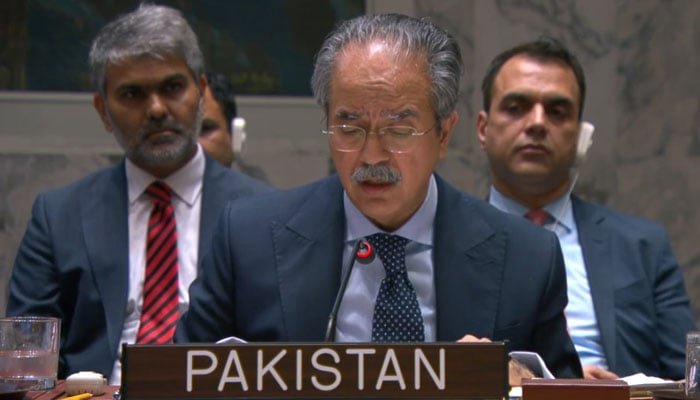During an emergency session of the UN Security Council on Friday, Pakistan voiced its deep concern over Israel’s strikes on Iranian nuclear and military installations. Ambassador Asim Iftikhar Ahmad, Pakistan’s Permanent Representative to the UN, warned that these actions pose a “grave danger and a serious threat” to regional and global peace, security, and stability.
The Security Council interrupted its regular schedule to address the escalating crisis, also hearing from the head of the UN’s nuclear watchdog.
Ambassador Ahmad strongly condemned Israel’s actions as “unjustified and illegitimate aggression,” reaffirming Pakistan’s solidarity with Iran. This emergency session was convened at the request of Iran’s Foreign Minister, who argued that Israel had crossed all boundaries and must be held accountable. Pakistan, along with China and Russia, supported Iran’s call for the meeting.
Amid rising tensions, Pakistan urged the Council to uphold international law and immediately put a stop to the aggression, advocating for a resolution through dialogue and diplomacy.
Rosemary DiCarlo, the UN Under-Secretary-General for Political Affairs, briefed the Council, noting that the attacks’ repercussions were already being felt. She reiterated the Secretary-General’s condemnation of any military escalation in the Middle East, urging both Israel and Iran to exercise restraint and avoid a wider conflict. She also mentioned that the escalation jeopardized promising diplomatic developments, including planned US-Iranian talks in Oman, which Iran has reportedly cancelled. DiCarlo emphasized the need for all parties to remain committed to diplomacy, stating that negotiation remains the best path toward ensuring the peaceful nature of Iran’s nuclear program and preventing a broader and more dangerous conflict.
Rafael Grossi, Director General of the International Atomic Energy Agency (IAEA), also addressed the Council. He emphasized that nuclear sites must never be targeted, citing serious implications for nuclear security, safety, safeguards, and international peace. He stated the IAEA was in contact with Iranian authorities to assess the impact on affected facilities and offered to travel to the region to assess the situation and support safety, security, and non-proliferation efforts. Grossi concluded by stressing the need for dialogue and diplomacy, offering the IAEA as a neutral platform for factual engagement to replace escalation, and reaffirming the agency’s commitment to facilitating dialogue and promoting a peaceful resolution to nuclear issues in Iran.


